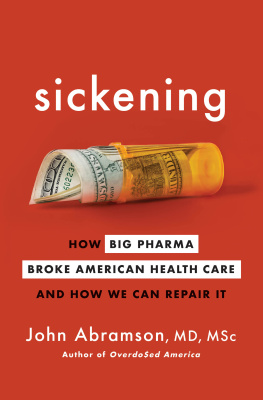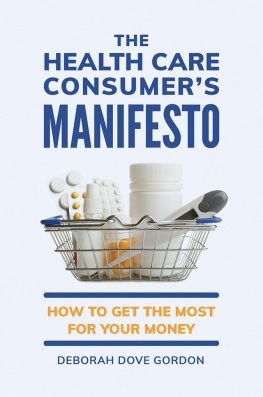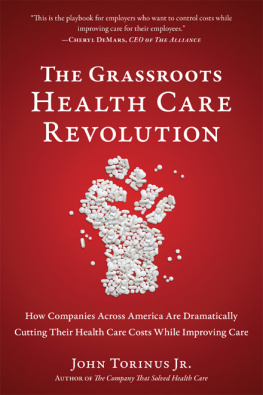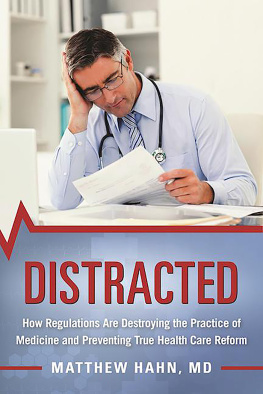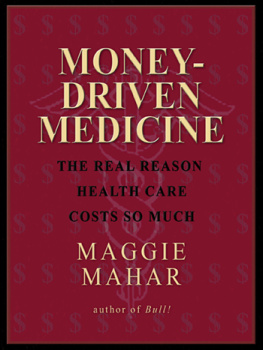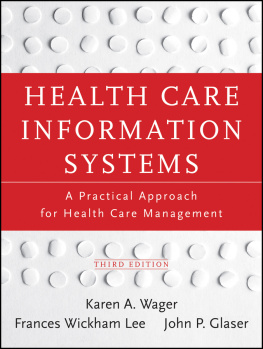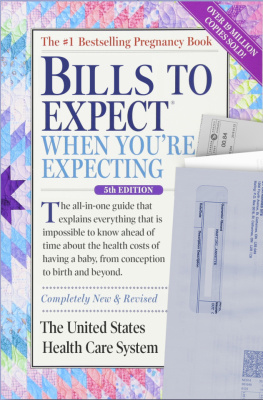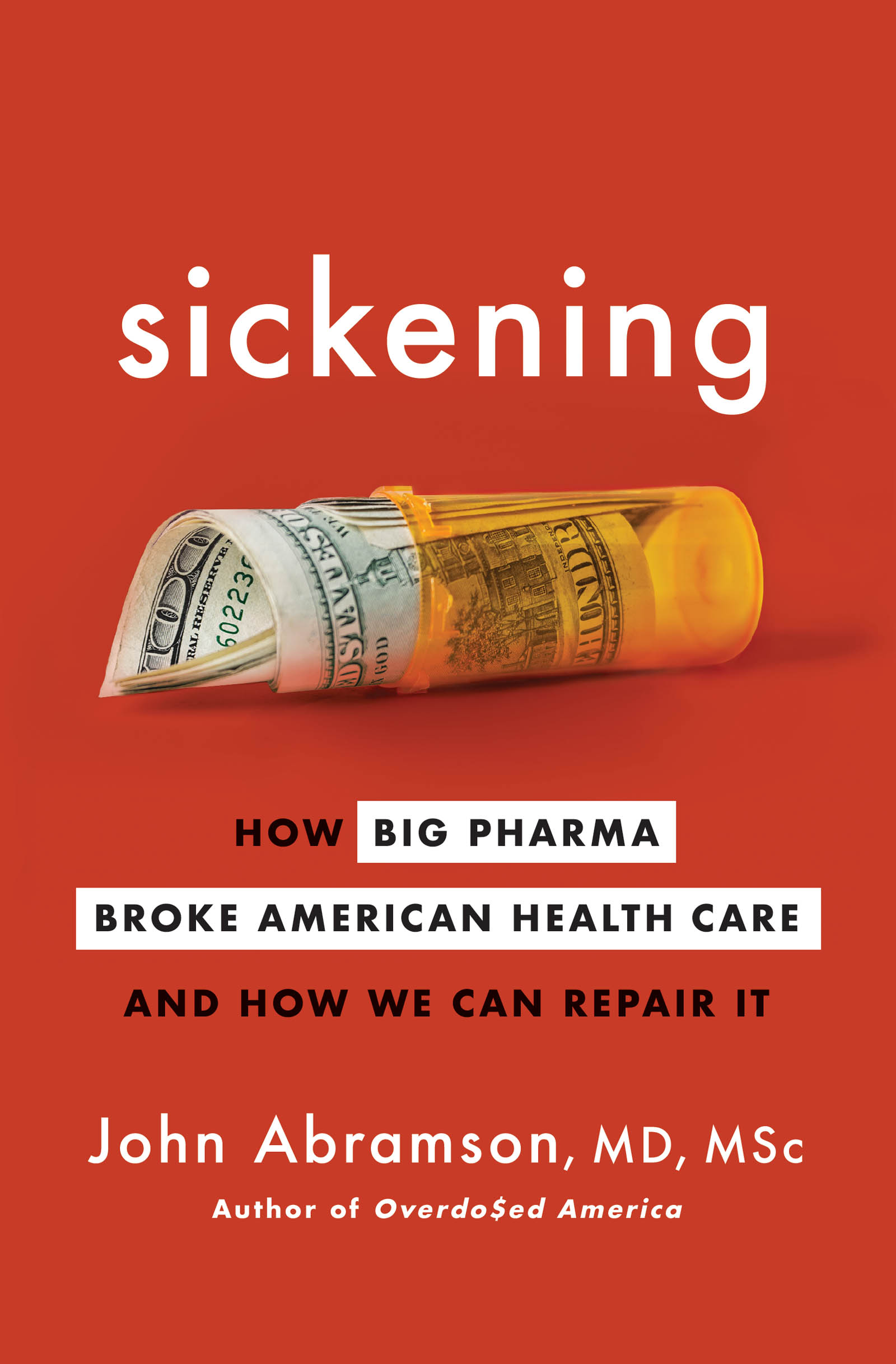Contents
Guide
SICKENING. Copyright 2022 by John D. Abramson LLC. All rights reserved under International and Pan-American Copyright Conventions. By payment of the required fees, you have been granted the nonexclusive, nontransferable right to access and read the text of this e-book on-screen. No part of this text may be reproduced, transmitted, downloaded, decompiled, reverse-engineered, or stored in or introduced into any information storage and retrieval system, in any form or by any means, whether electronic or mechanical, now known or hereafter invented, without the express written permission of HarperCollins e-books.
Cover design by Kerry Rubenstein
Cover image Getty Images/Sawaya Photography
marinerbooks.com
Digital Edition FEBRUARY 2022 ISBN: 978-1-328-95698-9 (e-book)
Version 01122022
Print ISBN: 978-1-328-95781-8 (hardcover)
ISBN 978-0-358-57836-9 (audiobook)
ScoutAutomatedPrintCode
$ScoutAutomatedPO
THE RESEARCH AND IDEAS PRESENTED IN THIS BOOK ARE NOT INTENDED TO BE A SUBSTITUTE FOR CONSULTATION WITH YOUR DOCTOR OR OTHER HEALTH-CARE PRACTITIONER. BEFORE STARTING OR CHANGING ANY MEDICAL TREATMENT OR OTHER REGIMEN, DISCUSS THE ISSUE(S) WITH YOUR HEALTH-CARE PROFESSIONAL.
To Charlotte, without whose love, friendship,
indefatigable support, and fearless criticism
this book would not be possible
Be not intimidated, therefore, by any terrors, from publishing with the utmost freedom, whatever can be warranted by the laws of your country; nor suffer yourselves to be wheedled out of your liberty by any pretences of politeness, delicacy, or decency. These, as they are often used, are but three different names for hypocrisy, chicanery, and cowardice.
JOHN ADAMS,
A Dissertation on the Canon and Feudal Law, 1765
Modern medicine has been a powerful force for good, and many people owe their lives to that power. However, because of humanitys shared reverence for that success, combined with the increasing financial rewards from the industrialisation of healthcare, almost everyone has been slow to recognise that medicine also has great power to harm.
IONA HEATH,
British Medical Journal, February 2020
Contents
T ragically, during the first year of the coronavirus pandemic, an average of fourteen hundred Americans lost their lives to COVID-19 every day. Far more tragically, but with far less public awareness, Americans have been dying unnecessarily at almost the same rate for two decades.inferior health and health care.
Not only is our health worse, but the pace at which we are falling behind is accelerating. For example, the (pre-pandemic) rate of American deaths that could have been prevented by adequate medical care was by far the highest: half again higher than the average of nine other wealthy countries. Similarly, the United States ranks lowest in quality and access to health care among eleven wealthy nations, and it is the only country to have declined on this measure since 2010, despite the expanded access provided by Obamacare. And since 2000, Americans healthy life expectancy has plummeted from thirty-eighth in the world to sixty-eighth in 2019 (now behind China, Cuba, and Jamaica). Citizens of Japan live 8 years longer in good health and Canadians live 5.2 years longer in good health than Americans do. How can this possibly be, when Americans clearly have the best access in the world to the latest medical advances? The unvarnished truth is that the siren call of breakthrough medical innovation commands far more of our attention than the alarms set off by the decline in our health.
Making matters even worse, while we are spending 17.7 percent of our GDP on health care annually, eleven other wealthy countries are spending an average of just 10.7 percent. This additional 7 percent of GDP translates into our spending an excess $1.5 trillion on health care every year. To put this in more personal terms, despite our health losing so much ground in comparison to that of other wealthy and not-so-wealthy nations, Americans spend $4,500 extra per person each year like an unlegislated tax on health care.
Obviously, there is no single source of the dysfunction in our health-care system, but the most powerful force driving this toxic combination of poor health and high costs is Big Pharmas influence on American medical care. And the reason the pharmaceutical industry has been able to achieve this tail wags dog position is that, over the past forty years, public funding for clinical research and federal support of university-based medical research has declined, allowing the drug companies to step in to fill the gap. This has led to increased commercial influence over much of the information that doctors rely on to determine optimal treatment for their patients.
The pharmaceutical companies now control most of the medical research agenda, and their primary goal is not to improve Americans health but to maximize their own profits, which they do masterfully. To that end they control the design, conduct, and analysis of most clinical research; and they largely control the delivery of the results of that research across the entire spectrum, from the most respected peer-reviewed medical journals to all those annoying drug ads on TV. Although the supposed purpose of this information is to educate doctors and the public, it is truth be told carefully curated to disseminate key marketing messages designed to maximize drug sales.
Still, how does it happen that so many smart, well-trained, hardworking, and dedicated physicians are misdirected by the commercially motivated knowledge produced by this self-serving system? Ironically, doctors are vulnerable to this misinformation precisely because they are taught to base their practice on the best scientific evidence published in peer-reviewed medical journals, respected clinical practice guidelines, and recommendations made by recognized medical authorities. But these trusted sources have become increasingly dependent on drug-company funding.
One of the best-kept secrets in all of health care understood by few doctors is that the peer reviewers, medical journal editors, and guideline writers, who are assumed to be performing due diligence to ensure the accuracy and completeness of the data reported from company-sponsored studies, do not have access to the real data from these trials. The published reports that doctors accept as fully vetted scientific evidence can be more accurately described as unverified data summaries prepared largely by or for the sponsoring drug companies.
For sure, some newly approved drugs one out of eight provide heretofore unavailable medical benefits. These can be genuinely lifesaving or quality-of-life-improving, like the drugs that transformed HIV/AIDS from a death sentence into a chronic disease compatible with a normal life, drugs to treat hepatitis C, and drugs to treat (but not cure) cystic fibrosis. But unlike other wealthy countries, the United States lets drug companies charge as much as they want, so the drugs that offer unique benefits are generally priced at ransomlike levels. Moreover, because the industry controls much of the scientific evidence that reaches health-care professionals and the public, the seven out of eight newly approved drugs that do not provide previously unavailable benefits can be promoted as if they do. The business environment for prescription drugs in the United States is so different from that of other wealthy countries that an estimated two-thirds to three-quarters of global pharmaceutical profits come from the United States.

